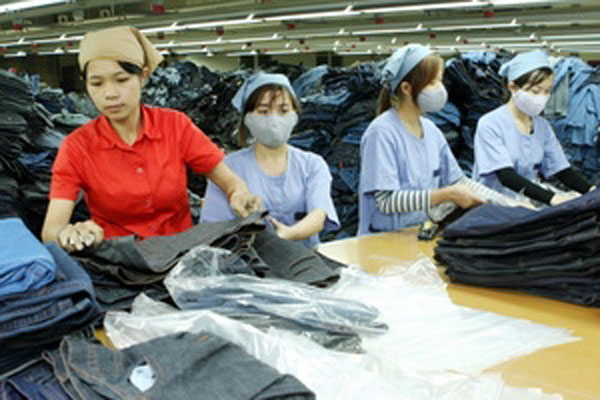
The textile and garment industry attracted a majority of the biggest foreign direct investment (FDI) projects approved in the first six months of this year though localities earlier announced to keep away from such projects as they need lots of labor and pose risks of environmental pollution.
 |
The textile and garment industry attracted a majority of the biggest foreign direct investment (FDI) projects approved in the first six months of this year though localities earlier announced to keep away from such projects as they need lots of labor and pose risks of environmental pollution.
Early this week, the government of Binh Duong Province awarded an investment certificate to Polytex Far Eastern Co. Ltd. under Taiwan’s Far Eastern Group to develop a US$274-million clothing project.
The biggest FDI project in the southern province in the year to date will go up on 99 hectares at Bau Bang Industrial Zone and produce supporting items for the apparel sector. It is designed to have an annual capacity of 43,200 tons of polyester, 127 million square meters of knitted fabric and 96 million square meters of cotton fabric.
The investor wanted to build the factory in Vietnam to capitalize on the opportunities from the Trans-Pacific Partnership (TPP). The group plans to invest an additional US$700 million to US$1 billion in the second phase of the project.
Earlier this year, three large-scale projects were approved for the textile and garment sector with two in HCMC and Dong Nai Province, according to statistics of the Foreign Investment Agency under the Ministry of Planning and Investment.
Dong Nai Province approved a US$660-million project of Hyosung Istanbul Tekstil Ltd. The largest project in January-June will make industrial fiber at Nhon Trach 5 Industrial Zone.
This is a Turkish-registered project but the actual investor is South Korea’s Hyosung Group. Hyosung Vietnam Co. Ltd. has been a familiar face in the textile and garment sector in the province with total registered capital of over US$995 million.
Hyosung decided to expand its investment in Vietnam to enjoy tax incentives and benefit from the U.S.-led TPP, according to industry watchers.
Owing to the project, Dong Nai beat its FDI target for the whole year and ranked second for FDI approvals in Vietnam in the first half of 2015 with a total of US$1.03 billion registered for new and operational projects.
Hong Kong’s Worldon Vietnam Co. Ltd. also got approval to carry out a US$300-million project in the apparel sector in HCMC. The project covers over 50 hectares at Dong Nam Industrial Zone in Cu Chi District.
With huge textile and garment projects, the nation’s manufacturing and processing sector received the biggest fresh FDI commitment of US$4.18 billion in the first six months of this year, making up 76.2% of the total FDI approvals in the period.
The TPP has encouraged many foreign textile and garment firms to boost investments in Vietnam. The yarn-forward rule under the TPP requires that the yarns, fabrics and final garments to be exported within the TPP should be produced in the TPP member countries. So, apparel producers in Vietnam will have to use domestic material or import it from the TPP members instead of China if they want to benefit from the multilateral trade pact.
There have been concerns that dyeing factories at the projects would cause environmental pollution. However, leaders of the localities said they had selected investors using high technologies and few employees.
(Source: SGT)




